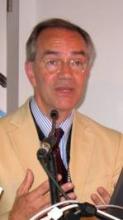Trust is the bedrock of scientific research. When you hear a researcher report results at a meeting or in a published paper, ultimately you trust that what the person says is true. Yes, there is peer review, attempts to replicate the findings by others, and the corroborative endorsement by associates and collaborators, but at the center there is the trust that the researcher has integrity and that by engaging in scientific research the researcher signed on to the moral contract to only report what to their best of their knowledge is true.
Of course it doesn’t always work that way. A few researchers fabricate and lie. Sometimes it’s caught, other times it goes undetected.
Earlier this month, another instance of biomedical-research fraud got caught, perpetrated this time by someone who seemed unlikely to present scientific lies yet did. On Nov. 17, Erasmus Medical Center in Rotterdam announced that the day before it had dismissed one of its prominent professors, Dr. Don Poldermans, “because of violation of academic integrity.”
The Erasmus press release said that a Medical Center inquiry committee concluded that Dr. Poldermans had been “careless in collecting the data for his research. In one study it was found that he had used patient data without written permission, used fictitious data and that two reports were submitted to conferences which included knowingly unreliable data.” The release noted that these missteps had “no medical implications for the patients who took part in the studies,” and said that Dr. Poldermans “agrees with the committee’s conclusions and expressed regret for his actions. Poldermans feels that as an experienced researcher he should have been more accurate but states that his actions were unintentional.”
The day before, Erasmus investigating committee had released a much more detailed, 12-page report in Dutch about its findings. The focus of their investigation was the six-part study led by Dr. Poldermans, the Dutch Echocardiographic Cardiac Risk Evaluation Applying Stress Echocardiography (DECREASE) study. The committee said it found instances of sloppy data collection in two of the DECREASE studies, along with manufactured data in one of them.
A week later, on Nov. 23, the European Society of Cardiology announced that this led Dr. Poldermans to resign from the ESC’s Committee for Practice Guidelines.
I was shocked to hear these developments. Dr. Poldermans had been a low-profile but notable presence at major cardiology meetings for many years; modest but knowledgeable, opinionated and respected, always courteous and helpful and willing to speak with me. An anesthesiologist by training, he worked in Erasmus’ Department of Vascular Surgery, and over the years ran or collaborated on many studies of medical therapy for cardiovascular risk reduction, especially in patients undergoing vascular or other types of surgery. Here is just a sampling of the stories my colleagues and I wrote about research reported since the mid-2000s by Dr. Poldermans or one of his associates:
The role of renal impairment in outcomes of patients with coronary artery disease.
The value of various medical treatments for peripheral arterial disease.
The role for smoking cessation in patients following coronary artery bypass surgery.
The impact of coronary revascularization in patients undergoing major vascular surgery.
The benefit from perioperative statin treatment in vascular surgery patients.
I found the work that emerged from Dr. Poldermans group to be so consistently interesting and seemingly well-conducted that I usually made a point of looking for his group’s reports at meetings, just to see if they had another new finding that seemed worth covering.
The Erasmus investigation focused on problems with only a few of the many studies in which Dr. Poldermans took part. Perhaps they reviewed a larger portion of his work, but their report provided no details beyond the series of DECREASE studies, and even within that they said specifically that had limitations in fully reviewing DECREASE III and IV. But they identified serious issues with DECREASE II and VI, and the inevitable question lingers: What about everything else? What among Dr. Poldermans other body of work was pristine and untainted, and what wasn’t? That’s the problem with trust. Once shattered, it’s gone.
---Mitchel Zoler (on Twitter @mitchelzoler)

